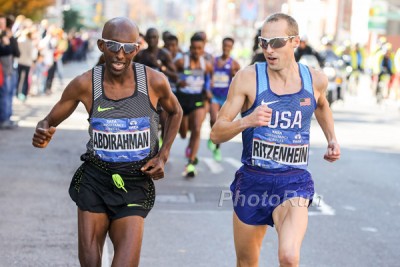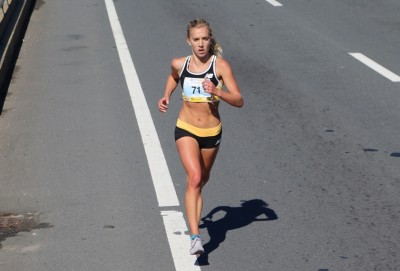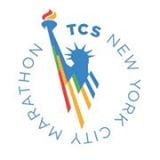The Week That Was In Running – October 31 – November 6, 2016
by LetsRun.com
November 8, 2016
In case you missed it, the last Abbott World Marathon Major of the year was held on Sunday as the 2016 TCS New York City Marathon is in the books. We broke the race down in great detail as it happened. To catch up on that analysis, go to our 2016 New York City Marathon special section.
We’ve still got New York fever in our blood, however, as we kick off the weekly recap with more New York thoughts below.
Past editions of The Week That Was can be found here. Questions or comments? Please email us or post them on our fan forum.
*****
The 2016 TCS New York City Marathon By The Numbers

Ritz and Abdi in New York
0 – number of sub-2:10 marathoners that third-placer Abdi Abdirahman finished ahead of in New York. New York only had six sub-2:10 marathoners in the field (and only four who had done it in the last three years) and three of them dropped out (Dathan Ritzenhein, Stanley Biwott and Lelisa Desisa).
Article continues below player.
1 – number of Eritreans that have won the New York City Marathon after Ghirmay Ghebreslassie became the first to do so on Sunday (2009 champ Meb Keflezighi of the U.S. was born in Eritrea).
1 – number of Kenyans in the top 10 of the men’s race in New York City this year. Before you make a big deal of this fact and the related fact that there were five American men in the top 10, please realize there were only two Kenyan men in the elite field to begin with.
2 – number of Americans that finished in the top three in New York thanks to the third-place showings by Abdi Abdirahman and Molly Huddle. It was the first time since 1994 that an American had finished in the top three of both the men’s and women’s races.
3 – number of consecutive New York City Marathons that Mary Keitany has won. Keitany joins Paula Radcliffe and Alberto Salazar as a three-time winner. Only Bill Rodgers (4) and Grete Waitz (9) have won more.
4 – number of women that broke 2:30 in New York in 2016. To find a year with fewer sub-2:30 performers, you’d have to go all the way back to 1998 when there were just two (there also were just four sub-2:30s in 1999 and 2009). Burundi’s Diane Nukuri placed fifth by running 2:33:04. You’d have to go all the way back to 1996 to find a year where you could place top 5 by running that slow.
More: Year By Year # of Sub-2:30 Female Perfomances at the New York City Marathon
5 – 2:07:51 makes Ghirmay Ghebreslassie the 5th fastest performer in New York City history.
The 5 Fastest Times Run At The New York City Marathon
1 2:05:06 Geoffrey Mutai, Kenya 1st 2011
2 2:06:28 Emmanuel Mutai, Kenya 2nd 2011
3 2:07:13 Tsegaye Kebede, Ethiopia 3rd 2011
4 2:07:43 Tesfaye Jifar, Ethiopia 1st 2001
5 2:07:51 Ghirmay Ghebreslassie, Eritrea 1st 2016
5 – number of NYC Marathon wheelchair races that have now been won by Tatyana McFadden, tying her for the most in history with Kurt Fearnley and Edith [Hunkeler] Wolf.
8 – number of Americans in the top 10 on Sunday (five in the men’s race, three in the women’s). To find a year when there were more Americans in the top 10 in New York, you have to go all the way back to 1982 (there were also eight Americans in the top 10 in 2009 – six men, two women). In 1982, Alberto Salazar led the American charge by winning the last of his three titles as nine Americans (five men, four women) cracked the top 10.
More: Yearly List of Number of Americans in The Top 10 At New York City Marathon.
10 – number of seconds faster that Molly Huddle ran in her debut in New York (2:28:13) than American Laura Thweatt (2:28:23) ran in her debut in New York last year. One might argue that Huddle got 10x more publicity for her accomplishment. Huddle did place much higher than Thweatt (3rd versus 7th) but it should be pointed out that the depth of the 2015 New York field dwarfed that of the 2016 edition. In 2015, there were 11 women with PRs under 2:26 in the field. This year, there were just four (and one of them dropped out).
Molly Huddle is 4th fastest American debutant in New York history.
5 Fastest NY Debuts In US History
2:25:53 Kara Goucher, 3rd 2008
2:26:58 Deena Drossin (Kastor), 7th 2001
2:27:10 Marla Runyan, 4th 2002
2:28:13 Molly Huddle, 3rd 2016
2:28:23 Laura Thweatt, 7th 2015
14 – number of men that broke 2:20 in New York this year. That’s one more than what was achieved last year (13) which was the lowest total in 15 years. What’s the most sub-2:20s every recorded in New York? Keep reading.
18 – number of miles that Dathan Ritzenhein made it before dropping out with a heel injury. Ritz was pushing the pace and had the lead (or was on the leader’s shoulder) for 10 of the opening 11 miles which included a downhill 4:36 second mile. *Men’s mile by mile New York splits here.
33 – number of seconds that Eric Jenkins finished ahead of the women’s race winner, Karoline Bjerkeli Grøvdal, at the Abbott Dash to the Finish Line 5K held in Central Park the day before the marathon. Jenkins ran just 15:07 to Grøvdal’s 15:40. Jenkins’ former Oregon teammate, 3:34 1500 man Colby Alexander (who was 7th in the Olympic Trials 1500 this year), ran 15:38, just two seconds ahead of Grøvdal. Donn Cabral won the men’s race in 14:18.
More: Donn Cabral, Bjerkeli Grøvdal, Win Abbott Dash To The Finish Line 5-K
57.8 – number of seconds slower per mile that two-time US Olympian Kim Conley ran over the second half of the New York City Marathon as compared to the first. Before the race, Conley told us that she greatly enjoyed her marathon buildup and that her main goal was to have a positive experience as she said, “My goal is really to come away with a good experience. I’m hoping this is the beginning of a long marathon career. I’m hoping that it really leaves me excited about the future.”
Conley certainly came away with an experience that she’ll never forget, but we doubt she’s rushing to sign up for her next marathon as the second half of her 2:41:38 marathon was a disaster.
Conley ran her first half in 74:30 (5:41.0 per mile) but that proved to be too ambitious. She was basically already fried as in the second half, she only had two miles below 6:00 as she averaged 6:39.8 during her 87:08 second half. Conley’s mile-by-mile splits for miles 14-26 were as follows: 5:50, 6:08, 6:16 5:57, 6:03, 6:28, 6:49, 7:05, 6:54, 6:59, 6:54, 7:29, 8:31.
Conley was in no shape to talk to the media after the race, but she did send out a tweet.
63 – record for most number of sub-2:20s in a single New York City Marathon, in 1983. (14 did it this year).
We’ve compiled all of the sub-2:20s year by year in NY here: New York City Sub-2:20 Marathons By Year . The most sub-2:20s in any marathon in history came in London in 1991 where at least 105 people did it.
3:41:09 – time recorded in New York City Marathon by former longtime NYRR head Mary Wittenberg, her first time running (and finishing) the NYC Marathon.
51,388 – preliminary number of marathon finishers in New York this year according to the NYRR – a new world record. The previous record came in New York two years ago (50,530). According to the Association of Road Racing Statisticians, that is more than the total number of finishers in all marathons combined from the beginning of time through the end of 1969 (hat tip to Jesse Squire, whose marathon fact on the House of Run podcast caused us to look this up).
****
The Next Molly Huddle?
There were other road races held in the US last week besides in New York. At the 4th annual EQT 10 Miler in Pittsburgh, Molly Huddle‘s training partner Emily Sisson ran very well. She clocked a 52:03- the 2nd fastest 10-miler every run by an American on a record-eligible course – to nab second behind Ethiopia’s Buze Diriba’s 51:38, which was the 2nd fastest 10-miler ever run on US soil.

Emily Sisson on her way to victory at the 2016 Tufts Health Plan 10-K for Women (photo by Chris Lotsbom for Race Results Weekly)
52:03 is a very stong showing for Sisson and helps get her on the right track as she heads into 2017. The first half of Sisson’s 2016 season was disappointing, but she’s turned things around over the second half on the roads. After winning the NCAA title at 5000 indoors and out and running 5000 and 10,000 pbs of 15:12.22 and 31:38.03 respectively in 2015, Sisson failed to PR this year as her seasonal bests were 15:24.83 and 32:54.06 and she was just 10th in the 10,000 at the Olympic Trials.
However, she’s been running well of late on the roads. Two months ago, she was second at the US 20k champs in New Haven in 66:03. A month ago, she won her first US national title at the Tufts Health Plan 10K in a strong 31:47. In Pittsburgh, her 10-mile time equates to pbs at both 5000 and 10,000 according to Greg McMillan‘s calculator as he converts 52:03 for 10 miles to 15:00 and 31:09.
Sisson’s success at a race more than 50% longer than a 10k certainly won’t come as a surprise to Ray Treacy, the coach of Sisson and Huddle. He told both LetsRun.com and the Providence Journal last year he thought Sisson was made for the marathon so it will be interesting to see how long the 25-year-old waits before making her marathon debut.
In the men’s race in Pittsburgh, US 10,000-meter Olympian Leonard Korir won in 47:13.
More: Olympian Leonard Korir (47:13) And Buze Diriba (51:38) Win Pittsburgh 10 Miler
MB: Emily Sisson FTW- Is she the future of American marathoning?
****
Stat of the Week
$3,000 – appearance fee that Frank Shorter and Bill Rodgers received (according to an article by George Hirsch in the New Yorker) to run in the first five-borough New York City Marathon, held 40 years ago in 1976. Adjusting for inflation, that’s $12,729.07 in today’s dollars.
****
How Accurate is A Fitbit?
Sara Hall is sponsored by Fitbit and she wore a Fitbit Surge during her race in New York where she was 9th in 2:36:12. After the race, PR representatives for Fitbit sent us a screenshot of some of Sara’s stats that were recorded by her Fitbit Surge. We decided to look at the pace per mile recorded on her Fitbit and compare it to her official NYC splits which came from the timing mats to see how accurate the GPS is. It certainly appears the technology is working pretty well as over the span of four miles there was a discrepancy of just two seconds total.
| Sara Hall’s Split |
Fitbit |
NYRR Official Split |
| 4th mile |
5:30 |
5:32 |
| 5th mile |
5:27 |
5:28 |
| 6th mile |
5:27 |
5:31 |
| 7th mile |
5:36 |
5:31 |
| Total |
22:00 |
22:02 |
Download (PDF, 4.43MB)
****
Video Of The Week / Never Give Up
The end of the Colorado 3A girls high school cross country championships was quite exciting. We don’t want to ruin the outcome for you so watch it yourself.
More: Cross-country leaders collapse inches from finish line
****
Tweets of the Week
In case you hadn’t heard, the Chicago Cubs won the World Series last week. The MVP of the World Series was Ben Zobrist. It turns out that Zobrist used to be a pretty good cross country runner. As a freshman, he was the 6th man on a team that placed 5th at the Illinois state meet.
Three-time US cross country champion Chris Derrick saw that tweet and put that in perspective.
Who knows how good Zobrist would have been had he stuck with XC?
https://twitter.com/DanielHuling/status/794305759286685696
****
Quotes of the Week (that weren’t quote of the day)
#1 Haile G Has A New Job
“I am very honored that they trust me in this position.”
– Haile Gebrselassie talking after being elected to head the Ethiopian Athletics Federation last week.
More: Halie Gebrselassie Elected New Ethiopian Athletics Federation President
#2 It’s Tough To Be Nearly 7,000 Miles From Your Family
“When you live with your kids, your wife, you feel successful. But when your family is not with you…”
– 40-year-old Ethiopian Tesfaye Jifar, the 2001 New York City Marathon champ, talking in a fantastic profile by Andy Martino in the New York Daily News on how Jifar is now a cabbie in Boston, unable to get his family out of strife-ridden Ethiopia. Jifar won New York after 9/11 in a course record 2:07:43 – that time is still the second-best winning time in New York history.
More: The loneliness of the long-distance runner: A former NYC Marathon champion–turned cabbie struggles to get his family out of strife-ridden Ethiopia
#3 The Dirty Secrets From 1984 Are Starting To Come Out
“[IAAF head Primo Nebiolo informed me] about the decision he and [IOC head Juan Antonio] Samaranch had made about capping the number of positive (drug) tests in L.A. at a dozen. He said they had done it ‘to protect the Olympics and the USA’ so there would be no scandal.”
–Ollan Cassell, former Executive Director of USATF from 1980–1997, writing in his memoir, Inside The Five Ring Circus, about drug testing at the 1984 Olympics. The quote comes from an excellent article on Cassell by the Japan Times’ Ed Odeven: Gold in 1964 Tokyo Games set Cassell on life path.
****
A Few Random Thoughts – Will The Fukuoka Course Be Changed/D2 Nats Could Be Exciting
Last week, the elite field for the 2016 Fukuoka Marathon was released. We’re wondering if race organizers will need to come up with a new course.
Check out this sinkhole that developed in front of Hakata Station in Fukuoka.
Japan Running News’ Brett Larner reports it’s just a block or two off the course.
More: Former WR Holder Patrick Makau Returns To Fukuoka To Shoot For A Hat-Trick Victory Makau has won the past two years, but will face two others with sub-2:05 PBs including world silver medalist Yemane Tsegay (2:04:48) and James Kwambai (2:04:27). Field also includes Yuki Kawauchi, Eritrean record holder Yared Asmerom, Poland’s Henryk Szost and 2012 Olympic 10,000 bronze medalist Tariku Bekele, who will be giving the marathon another crack after dropping out of his debut in Tokyo last year.
###
D2 cross country nationals could be interesting
After getting spanked by Colorado Mines at the RMAC championships, 20 to 44, the Adams State men came back and tied Colorado Mines at their NCAA D2 regional over the weekend, 36 to 36 (Colorado Mines won the tiebreaker). The grudge match will continue at NCAAs. Last year, Colorado Mines ended Adams State’s three-year winning streak by earning its first-ever national title.
****
Recommended Reads
To read our favorite reads from previous weeks, go here.
****
Quotes Of The Day And Last Week’s Home Pages
To see the actual quotes of the day from last week or last week’s home page or any home page, go to our archive page.
Past editions of The Week That Was can be found here. Questions or comments? Please email us or post them in our running fan forum.

 Ritz and Abdi in New York
Ritz and Abdi in New York
